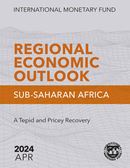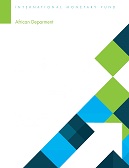This web page provides information on the activities of the Office, views of the IMF staff, and the relations between Rwanda and the IMF. Additional information can be found on Rwanda and IMF country page, including official IMF reports and Executive Board documents in English that deal with Rwanda.
At a Glance
- Rwanda joined the Fund in Joined: September 30, 1963
- Total Quotas: SDR 80.1 Million
- Loans outstanding: Poverty Reduction and Growth Facility (PRGF) arrangements SDR 9.72 million
- Last Article IV Consultation: 2014 Article IV Consultation and Second Review Under the Policy Support Instrument, (Country Report No. 14/343)
Office Activities
-
Recruitment Notice of an Office Manager in the Kigali office.
Interested candidates who match the criteria above are requested to send their CVs, along with cover letters to rr-rwa@imf.org no later than March 3, 2023.
February 17, 2023
-
IMF’s Abebe Aemro Selassie on Investment and Sustainable Debt Management in Africa
CNBC Interview
August 1, 2019
IMF's Work on Rwanda
-
The Evolving Role of Central Banks in Africa
June 7, 2024
Central banks need to be on their toes and be ready to make bold moves in the coming years. It will be about being practical, accepting trade-offs, learning lessons from around the globe, and acting on them. Moreover, it will be crucial to keep central banks as free from political strings as possible.
-
May 28, 2024
Series:Country Report No. 2024/141
-
May 22, 2024
The Executive Board of the International Monetary Fund (IMF) concluded the third reviews under the Policy Coordination Instrument (PCI) and the arrangement Under the Resilience and Sustainability Facility (RSF), and first review under the Standby Credit Facility (SCF) arrangement with Rwanda
-
Transcript of African Department April 2024 Press Briefing
April 19, 2024
Good morning and good afternoon and good evening for our viewers around the world. I am Tatiana Mossot with the IMF Communication department.
-
April 12, 2024
Regional Economic Outlook
April 19, 2024

After four turbulent years, the outlook for sub-Saharan Africa is gradually improving. Growth will rise from 3.4 percent in 2023 to 3.8 percent in 2024, with nearly two thirds of countries anticipating higher growth. Economic recovery is expected to continue beyond this year, with growth projections reaching 4.0 percent in 2025. Additionally, inflation has almost halved, public debt ratios have broadly stabilized, and several countries have recently issued Eurobonds, ending a two-year hiatus from international markets. However, not all is favorable and risks to the outlook remain tilted to the downside. The funding squeeze persists as the region’s governments continue to grapple with financing shortages, high borrowing costs, and impending debt repayments. Amid the challenges, sub-Saharan African countries will need additional support from the international community to develop a more inclusive, sustainable, and prosperous future.
Read the Report
Fraudulent Scam Emails Using the Name of the IMF
We would like to bring to the notice of the general public that several variants of financial scam letters purporting to be sanctioned by the International Monetary Fund (IMF) or authored by high ranking IMF officials are currently in circulation, and may appear on official letterhead containing the IMF logo. The scam letters instruct potential victims to contact the IMF for issuance of a “Certificate of International Capital Transfer” or other forms of approval, to enable them receives large sums of monies as beneficiaries. The contact e-mail information is always BOGUS and unsuspecting individuals are then requested to send their personal banking details which the scammers utilize for their fraudulent activities.For more information please see Fraudulent Scam Emails Using the Name of the IMF
African Departmental Papers




